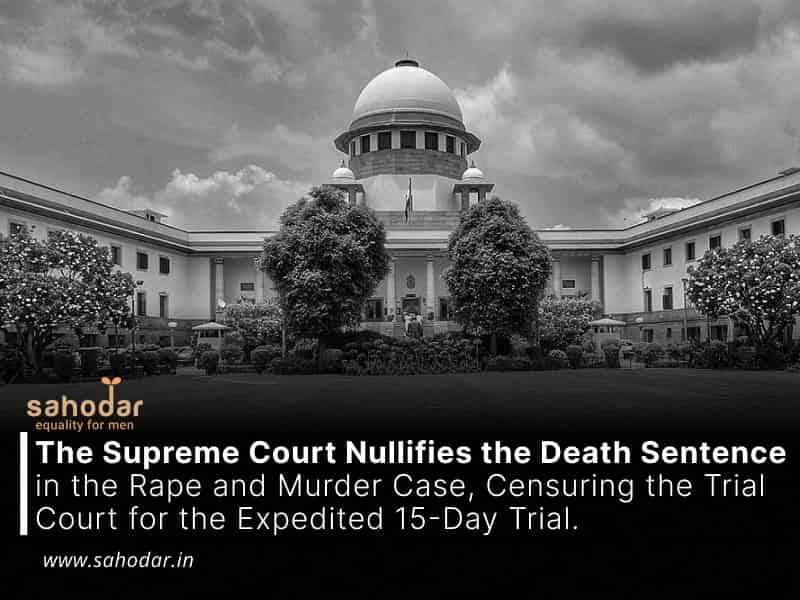“The Trial Court treated the accused as if he is carrying a magic wand which is available to produce highly qualified experts…There was no opportunity…to the appellant to cross-examine the experts”, the Court found.
In the matter of Naveen @ Ajay vs. State of Madhya Pradesh, the Supreme Court, in its adjudication on Thursday, nullified both the death sentence and conviction of the defendant in a case involving rape and murder. This judicial decision emanated from expressed apprehensions regarding the expeditious nature of the 15-day trial that resulted in the defendant’s conviction.
The panel of Justices, namely BR Gavai, PS Narasimha, and Prashant Kumar Mishra, levied critical remarks against the trial court for the rapidity with which the proceedings were conducted. Consequently, the Supreme Court, exercising its prerogative, has remanded the case to the trial court, directing the initiation of a fresh trial.
“The Trial Court conducted the trial in a hurried manner without giving proper opportunity to the accused to defend himself .. the matter is remitted back to the trial court for de novo trial by affording proper opportunity to the appellant to defend himself,” the Court directed in its October 19 order.
The Supreme Court has issued supplementary directives, mandating the retention of senior counsel for the defense of the accused during the forthcoming retrial within the trial court.
This development transpired in the context of the Court’s adjudication of an appeal contesting a 2018 ruling by the Madhya Pradesh High Court, which had affirmed the trial court’s imposition of the death penalty in a case involving the rape and murder of a 3-month-old infant. It is pertinent to note that the original trial culminated within an unusually abbreviated span of 15 days.
The Court’s attention was drawn to the fact that the alleged incident transpired on April 20, 2018, with the expeditious filing of the chargesheet within a week. Subsequently, the trial proceedings commenced on April 27, 2018, culminating in the pronouncement of the death sentence on May 12, 2018.
Among a litany of concerns articulated, the Supreme Court expressed reservations about whether the defense counsel had been provided with all requisite evidentiary materials crucial for the presentation of cogent final arguments.
Additionally, the bench observed an infirmity in the High Court’s adjudication. Specifically, the High Court’s refusal to allow the accused an opportunity to challenge specific expert medical reports was noted. The High Court’s rationale was premised on the accused’s potential to cross-examine the authors of the aforementioned reports during the course of the original trial. However, the Supreme Court opined that the constricted timeframe provided by the trial court had rendered such a course of action impracticable.
“It was impossible for the accused himself to produce … the authors of the Reports, in one day because the said experts are government servants and could not have attended the Court at the request of an accused in jail. The Trial Court treated the accused as if he is carrying a magic wand which is available to produce highly qualified experts, who are government servants, on a phone call. There was no opportunity, in the real sense, to the appellant to cross-examine the experts,” the top Court observed.
In its judgment, the apex court further emphasised that it was important for courts to maintain ‘judicial calm‘ to ensure a fair trial.
“In the hallowed halls of justice, the essence of a fair and impartial trial lies in the steadfast embrace of judicial calm. It is incumbent upon a judge to exude an aura of tranquility, offering a sanctuary of reason and measured deliberation. In the halls of justice, the gavel strikes not in haste, but in a deliberate cadence ensuring every voice, every piece of evidence, is accorded its due weight. The expanse of judicial calm serves not only as a pillar of constitutional integrity, but as the very bedrock upon which trust in a legal system is forged,” the Court said.
The Court proceeded to accede to the appeal lodged by the appellant, resulting in the quashing of the previously imposed death sentence.
The appellant, bearing the name Naveen @ Ajay, was duly represented by a legal team featuring Senior Advocate BH Marlapalle and further comprising advocates Bhavesh Seth, Avinish Kumar Saurab, Harini Raghupathy, Rajat Mittal, and Ajith Pravin Wagh.
The Madhya Pradesh government was represented by a legal team comprised of advocates Pashupathi Nath Razdan, Maitreyee Jagat Joshi, Smriti Razdan, Indira Bhakar, Astik Gupta, Prakhar Shrivastava, and Akanksha Tomar.

